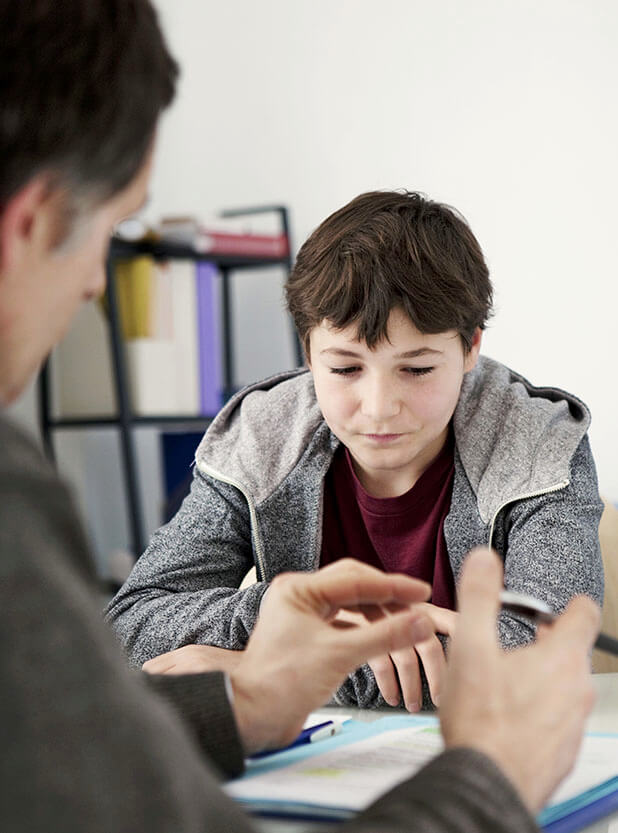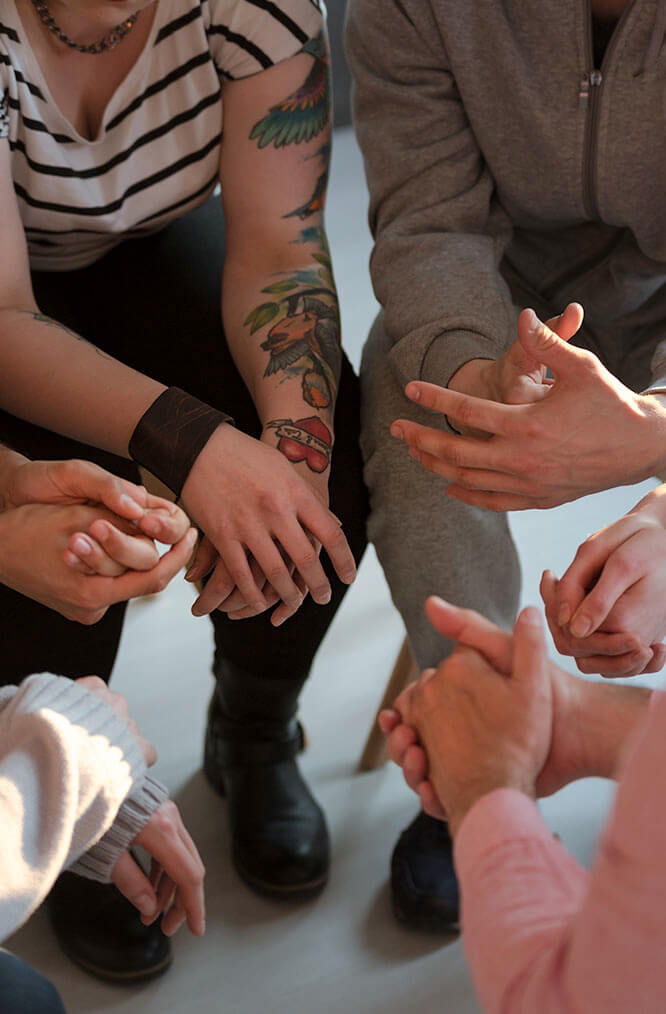
TEEN DRUG ADDICTION
Millions of teenagers in the United States abuse drugs; yet only a few thousand get the help they need. That’s truly unfortunate given that teen drug addiction is treatable and professional rehabilitation is accessible to people across all socio-economic groups.
We believe that parents play a major role in ensuring recovery from teen drug addiction. Your 16-year old is at an impressionable age. He/She may start using drugs because of peer pressure. Experimenting with drugs is a normal part of teenage life. But, of course, when it spirals into dependency, you’ve got a problem you cannot ignore.
Crestview Recovery has worked with many teens and their parents seeking sustainable de-addiction. This is accomplished through teen drug addiction treatment programs like an Oregon alcohol addiction treatment program, heroin addiction rehab in Oregon, and Oregon outpatient drug rehab center. Our rehabilitation for Pacific Northwest residents encompasses an entire spectrum of Class A drugs and prescription medication, including but not limited to Cocaine, Heroin, Opioids, and Meth.
HOW PREVALENT IS TEEN ADDICTION IN OREGON?
Every couple years the Substance Abuse and Mental Health Services Administration publishes a state-level look at addiction. So here’s what they found in Oregon. Approximately nine percent of Oregon adolescents have used marijuana in the past month. We should note, however, that this is a slight decline from the previous period. In the same period, around 12 percent of teens used alcohol.
On top of that, similar research from U.S. Department of Health & Human Services found that nearly four percent of teens surveyed misuse opioid medications. As you might expect, that percentage goes up significantly for older teens moving into their early 20’s.

Throughout the US, in 2016, prescription opioids and their street equivalents heroin, fentanyl, and other opioids have taken over 40,000 lives. In fact, in 2015 alone, four thousand teens and young adults died from this one drug class.
The sooner a teen starts a teen drug addiction treatment program, the better their chances of escaping the hold that drugs have on them. Certainly, getting your child into a teen drug addiction treatment center can, in effect, help an adolescent struggling today go on to lead a productive drug-free life.
HOW IS ADDICTION DEFINED?

The American Society of Addiction Medicine (ASAM) defines addiction as, “a primary, chronic disease of brain reward, motivation, memory, and related circuitry. Dysfunction in these circuits leads to characteristic biological, psychological, social and spiritual manifestations. This is reflected in an individual pathologically pursuing reward and/or relief by substance use and other behaviors.”
A teen with an addiction has difficulty abstaining from drug use. As a result, they may struggle to see how what they are doing impacts them and their family. In other words, what would be obvious to someone not addicted to drugs simply isn’t that clear-cut to the person suffering from the addiction.
As most parents do, you likely have some reservations about any kind of teen drug use, as do we. But it’s important to note here that teen drug dependence isn’t merely using or experimenting with drugs and/or alcohol. Addiction is generally thought of by the professional community as a disorder of the brain as described above. Furthermore, it’s defined by the manifestations of addiction, such as failing health or trouble in school or work
WHAT ARE THE WARNING SIGNS OF DRUG ADDICTION IN TEENS?
People who are addicted to drugs display certain psychological, behavioral and even physical changes. So you can detect these through attentive observation.
Watch out for things like:
Frequent mood swings, low energy, and problems with concentration or memory
Slurred speech or increased talkativeness and rapid speech
A noticeable change in personality or attitude
Shaking, tremors or seizures (with no prior history or known medical condition)
High energy followed by low energy and motivation, including drowsiness
Track marks on legs or arms (indicating intravenous drug usage. This, in particular, is a huge red flag.
If your son or daughter has started taking painkillers very frequently for some reason, you definitely want to confirm if there is a medical condition they’re hiding. It is also possible that an existing medical condition is making them more dependent on prescription pills than normal. In this case, you may find missing medication in your cabinets.
PLANNING AN INTERVENTION FOR TEEN DRUG ADDICTION
Rarely do teens talk to their adult family members about their struggles with substance addiction. When you step in, take care to do it sensitively and correctly. Your goal is to encourage your teen to enter a rehab program.
To this end, try to process any anger or sadness as well as experiences you may have about adult or teen drug addiction in the past. Unprocessed emotions and trauma on your part make it easier for things to escalate. If your teen starts shifting blame or saying mean things, you could become triggered. But you can help your child by mentally preparing yourself.
Avoid being aggressive or accusatory with your child. But do be firm about starting therapy immediately.
Intervene fully prepared. If you don’t, you may scare off your child and prompt them to make excuses. The goal of intervention is not to work your teen up. It’s not to make them feel like a terrible person. Rather, make them realize how addiction has affected their life and how it will impact them in the future.
Additionally, writing a letter to your teen is a good approach. Express your feelings. But don’t blame. You can also talk about the changes you’ve seen in them. Focus on how you feel in response to the teen’s actions rather than saying things like, “You make me feel X” or “You make me do X”. By avoiding accusatory language like this, you retain your power over your own feelings and actions.
State your concern for their well-being and reiterate that you will always be there to support them.
I’ve worked in the addiction treatment field since 2010. Crestview Recovery is far and above, the best organization I’ve ever been affiliated with. It’s truly an honor to be part of a program that puts such compassion and careful thought into helping their clients achieve wholeness and sustainable recovery.
– Ryan O.
WHAT IS WITHDRAWAL LIKE?
A thorough teen drug addiction treatment program starts with a medically-supervised detox. This is a very critical time for your teen and can even be dangerous. Because of that, medical supervision is the safest way to accomplish this. During detox, your child will experience withdrawal symptoms.
These will vary between individuals and depend on the type of substance that has prompted this visit to a teen drug addiction treatment center. Withdrawal occurs because the brain has learned to depend on the substance for survival. Symptoms may include:
Severe cravings
Chills, fever, and sweats
Sleeplessness
Irregular heartbeat
Trouble breathing
Severe anxiety, which may include an “I’m going to die” feeling
After detox, your child will enter a teen drug addiction treatment program, which may include:
Partial hospitalization
Outpatient treatment
Alumni/Aftercare
TEEN DRUG ADDICTION TREATMENT PROGRAM AT CRESTVIEW: WHAT TO EXPECT
We are one of the few facilities offering drug rehab for young adults in the Pacific Northwest. When you’re ready to begin recovery, our addiction specialists will design an individualized plan for your treatment. After considering the facts of the case, our professionals will evaluate the patient’s unique circumstances. In this way, we’ll ensure that we address any issues necessary to ensure a successful recovery.
Here are just some reasons why we’re the preferred teen drug addiction treatment center.

YOUR DUAL DIAGNOSIS TREATMENT CENTER: CRESTVIEW RECOVERY
Located in Portland, Oregon, Crestview Recovery offers treatment for individuals with co-occurring disorders. We use evidence-based techniques for all types of substance abuse. Our facility offers activities such as skiing, snowboarding and whitewater rafting. Along with dual diagnosis therapy, our staff of clinicians provides:
Proximity to patients’ homes: teens entering 90-day rehab don’t feel overwhelmed or scared as their home and loved ones are a short distance away
24/7 medical supervision to handle withdrawal expertly
Master therapists proficient in a range of therapies, including group therapy, dual diagnosis treatment, trauma therapy, and family therapy
Outdoor activities such as whitewater rafting, skiing, snowboarding, that encourage a change in thinking among teens bogged down by the pressure
Addiction doesn’t have to define you and your child’s lives. You can find healing and hope through a teen drug addiction treatment program. So call us at 866.262.0531 to start planning your child’s recovery journey from addiction.
